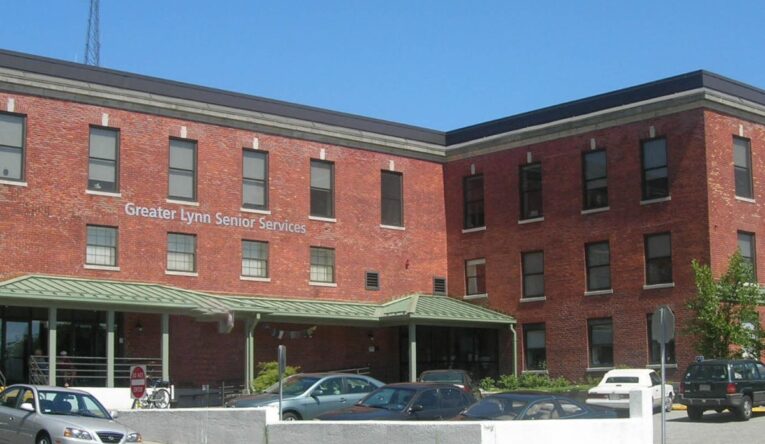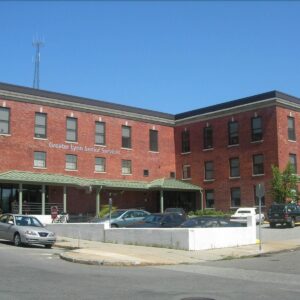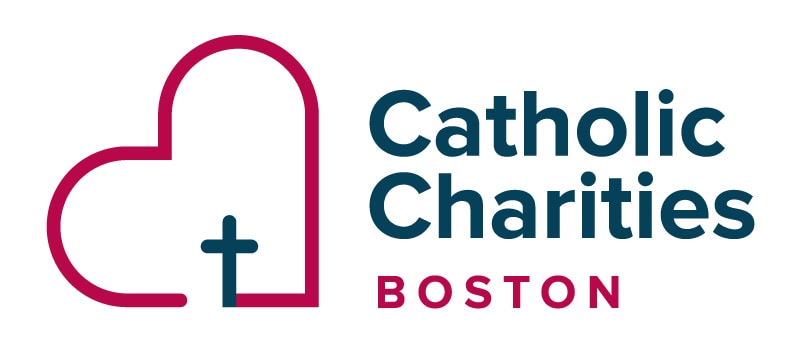Catholic Charities and GLSS Announce Plans for New Food Pantry in Downtown Lynn

Greater Lynn Senior Services (GLSS) and Catholic Charities Boston have announced their plans to develop a food pantry in downtown Lynn as part of the emerging Phoenix Food Hub initiative. The two local nonprofits have entered into an agreement for Catholic Charities to lease approximately 3,600 square feet of space on the first floor of GLSS’ office building located at 8 Silsbee Street. The food pantry will be one of the key programs in the Phoenix Food Hub initiative—a community-wide collaboration among members of the City’s Food Security Task Force, offering a wide array of nutrition-related supports and resources.
“We are delighted to announce this important partnership,” said Kathryn C. Burns, GLSS’ CEO. “The food pantry is a critical piece of this new initiative, which addresses food insecurity through a systemic solution in collaboration with other social services agencies like Catholic Charities.”
“The COVID-19 pandemic has worsened the food insecurity crisis in Massachusetts, increasing the urgency to get this pantry open to those in need as quickly as possible,” said Fran Troutman, director of Catholic Charities North. “Once we complete the build-out of this state-of-the-art pantry later this spring, Lynn residents will have easier access to nutritious food.”
GLSS is the lead agency in developing and managing Phoenix Food Hub’s operations. In addition to Catholic Charities, key partners include the City of Lynn, Lynn Community Health Center (LCHC), LEO, New American Center, The Food Project, Mutual Aid Lynn, and Lynn Grows. Funding partners include Mass General Brigham, Point32Health Foundation (formerly Tufts Foundation), Element Care, the City of Lynn, and many local organizations and residents.
Catholic Charities has deep expertise in addressing the alarming rise in food insecurity in Massachusetts. It operates five other pantries throughout Eastern Massachusetts and distributed 3.5 million pounds of food last year, up 102% from pre-pandemic levels.
According to Project Bread, a nonprofit that works to end hunger in the state, a record number of Massachusetts households are food insecure—double the amount pre-COVID-19. More than half a million residents—more than a quarter of them children—who are eligible for SNAP, don’t receive food stamps or other nutrition-based resources. In Lynn, assessments conducted by LCHC found an average 74 patients faced food insecurity concerns every week over a six-month period. GLSS estimates almost a third of those who utilize its services are at high risk of insufficient nutrition.
“Food insecurity almost always indicates other underlying societal challenges,” Burns notes. To address this, Phoenix Food Hub will also offer housing advocacy, mental health counseling, stress management, and mobility training, as well as healthy cooking classes, nutrition screening, and benefits counseling to those eligible for SNAP, WIC, and other nutrition-based resources. Its central location in an area with limited markets and within walking distance to housing sites—many for older people—addresses accessibility issues. Outreach will be culturally and linguistically appropriate to meet the needs of the area’s diverse populations. Support services will also be available onsite to address other important needs that people may have.

The project is unfolding in increments but is already making a difference. In the past few months, three Winter Farmers’ Markets, sponsored by The Food Project and attended by hundreds of people, were held and four more are planned in February and March. People who are assessed by LCHC as food insecure or having other nutrition insufficiencies are being referred for education, counseling, and information about other community resources. A state-of-the-art teaching kitchen is currently being designed to provide healthy cooking classes and other educational opportunities to individuals and families. This is in addition to a monthly Brown Bag distribution program offered on site in conjunction with the Greater Boston Food Bank.
“We hope our efforts to address social and health inequities by removing barriers to comprehensive services—including nutritious food—will become a model for other communities across the country,” Burns says. Construction of the teaching kitchen should begin in the spring, with full operations planned by fall 2022.
About Greater Lynn Senior Services
GLSS is a nonprofit organization serving people age 60 and older, adults of all ages living with disabilities, and their families and caregivers in Lynn, Lynnfield, Nahant, Saugus, Swampscott, and beyond. GLSS provides a wide range of programs and innovations to help people remain living independently, safely and with dignity.
About Catholic Charities Boston
As one of Massachusetts’ largest social service organizations, Catholic Charities of Boston serves our most vulnerable neighbors each year, regardless of religion, race, gender, age, disability, or ethnicity. Catholic Charities has five hub locations in Dorchester, Lynn, Brockton, Lowell, and South Boston, with 23 program locations supporting families across Eastern Massachusetts. The agency’s four core services assist clients with Basic Needs, Family & Youth Services, Adult Education & Workforce Development, and Refugee & Immigrant Services. We help our clients move from crisis to stability to self-sufficiency.
Sign up for our mailing list to receive stories and updates about the mission and impact of Catholic Charities Boston and learn more about upcoming events and volunteer opportunities.
"*" indicates required fields
